Identity, boundaries and new ways of thinking
Mennonites in Canada today are a diverse group, and the old stereotype of Mennonites as German-speaking agrarian people fits only a small part of the picture.
Mennonites in Canada today are a diverse group, and the old stereotype of Mennonites as German-speaking agrarian people fits only a small part of the picture.
In opening comments at Mennonite Church Alberta’s first of three Vision 2020 gatherings, Tim Wiebe-Neufeld, the regional church’s executive minister, asked people in the crowd to stand if they had left their place of birth in search of new life and opportunities.
After more than three years and with a budget of $1.4 million, Hagerman Mennonite Church in Markham, Ont., has completed a significant building renovation. But more than efficient space and a sleek exterior, the project represents the power of this church, a diverse partnership of different congregations, to work together as the body of Christ to accomplish big things as a community.
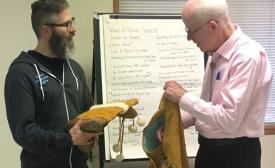
As a sign of honour and respect for the work of Steve Heinrichs, left, Mennonite Church Canada’s director of Indigenous-settler relations, Lorne Brandt, the chair of Mennonite Church B.C.’s Service, Peace and Justice Committee, presents his vest and moccasins, that were made by Cree craftspeople in Manitoba in 1974, to him at a meeting of the regional church’s Indigenous Relations Group. (Photo by Henry Krause)
A vest and moccasins presented to the Mennonite Church Canada director of Indigenous-settler relations symbolized the ongoing work of Indigenous relations in B.C.
When discussing the question of ethics in the church or in society at large, there is an increasing cacophony of voices laying claim to the ideological space governing the collective sense of right and wrong. What’s more, the loudest and most prominent voices tend to drive home the idea that what is right for one may be wrong for another, so people should live and let live.
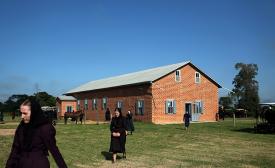
If Manitoba Colony members are accused of a crime, they are brought before the congregation at church and judged. For serious offenses like incest, they may be excommunicated, but if they ask for forgiveness, they can return a week later. (Photo by Noah Friedman-Rudovsky (noahfr.com))
Eight men went to prison, the media gaze moved on, and colony life resumed. But the saga of mass rape in the Bolivian corner of our family of faith is far from over.
Eight men went to prison, the media gaze moved on, and colony life resumed. But the saga of mass rape in the Bolivian corner of the Mennonite family of faith is far from over.
Anyone who has operated a computer knows that, from time to time, it’s necessary to hit reset. The same is true in the life of faith.
The peace pole and peace garden in front of Steinbach Mennonite Church connect the congregation with more than 200,000 groups and churches worldwide that desire a world at peace.
The pole displays the prayer, “May peace prevail on Earth,” in eight languages. Surrounding the pole is a newly planted peace garden with an inviting path and benches.
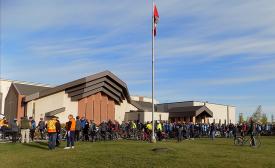
Bikers taking part in the Winnipeg Ride for Refuge, including those riding in support of MC Canada Witness workers, are pictured at Covenant Christian Reformed Church before the ride began. (Photo courtesy of MC Manitoba)
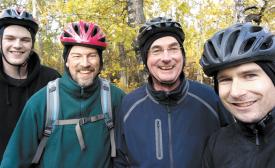
Team FMC Edmonton rode to support Witness workers Michael and Cheryl Nimz in the United Kingdom. Team members pictured from left to right: Jacob Wiebe-Neufeld, Tim Wiebe-Neufeld, Karl Blank and team captain Ryan Andres, all of Edmonton First Mennonite Church. (Photo courtesy of Karl Blank)

Craig Neufeld, team captain of the Rosthern Rouleurs, in action. The Rouleurs raised $4,320, the most of any of the 12 MC Canada teams. (Photo courtesy of MC Saskatchewan)
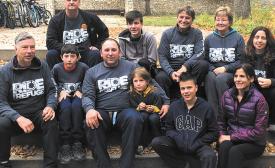
The Tiefengrunters was one of four teams from Saskatchewan taking part in this year’s Ride for Refuge on behalf of MC Canada. The four teams Saskatchewan raised a total of $9,665, nearly half of all the funds raised for MC Canada Witness workers. (Photo courtesy of MC Saskatchewan)
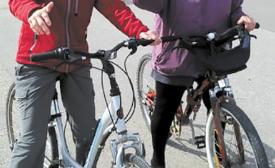
Mary Anne Falk, left, and Tina Doell both of Carman (Man.) Mennonite Fellowship, were riding for Christine and Tom Poovong, Witness workers in Thailand. (Photo courtesy of MC Manitoba)
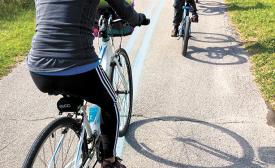
Team Mennonite Boys and Girls Can Ride from Toronto Chinese Mennonite Church raised $1,765 for MC Canada Witness workers during this year’s ‘Ride for Refuge.’ ‘We had a great ride,’ says team captain Brian Quan. ‘It was a picture perfect day for our 15 riders. (Photo by Brian Quan, Toronto Chinese Mennonite Church)
A big thank you to our 75 participants on 12 teams, and to our generous Mennonite Church Canada family who sponsored these riders in this year’s Ride for Refuge event held in communities across Canada on Sept. 29, 2018. Together, we raised more than $19,500 towards our International Witness ministry.
Moments in time can change the course of history. Decisions made in Russia in the years following the Russian Revolution in 1917 changed life for thousands of Mennonite families.
Eight men went to prison, the media gaze moved on, and colony life resumed. But the saga of mass rape in the Bolivian corner of our family of faith is far from over.
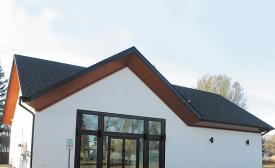
The new home of Langham Mennonite Fellowship stands on the same site as the old Zoar Mennonite Church. (Photo by Donna Schulz)

Ed Bueckert, Langham Mennonite Fellowship’s congregational chair, says the church wants its new building to be of service to the community. (Photo by Donna Schulz)
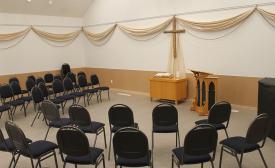
The church’s sanctuary is a multi-purpose room with space for about 80 worshippers. (Photo by Donna Schulz)
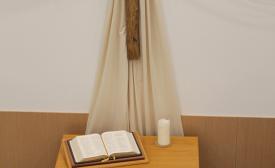
Among items carried over from the old church to the new are this cross and the church’s communion table. (Photo by Donna Schulz)
Zoar Mennonite Church in Langham has a new home—and a new name.
When the congregation discovered black mould growing in the basement of its old church building some years ago, it didn’t immediately decide to build a new church building. Instead, it gutted the basement and had it cleaned and disinfected. But the problem persisted, making some congregants unwell.
It was a rich night of worship as a diverse group of people gathered at the third annual intercultural worship service at Kitchener First Mennonite Church on Oct. 20, 2018.
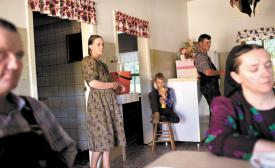
Abram Wall Enns, left, was the civic leader of the Manitoba Colony when rape stories first emerged. He wishes the leaders would have acted sooner. (Photo by Noah Friedman-Rudovsky noahfr.com)
Eight men went to prison, the media gaze moved on, and colony life resumed. But the saga of mass rape in the Bolivian corner of our family of faith is far from over.
A revitalized sense of mission has led to a change of name for an 81-year-old Vancouver Mennonite congregation. The church formerly known as First United Mennonite Church (often shortened simply to FUMC or 52nd because of its address at 659 E. 52nd Avenue) is now Peace Church on 52nd.
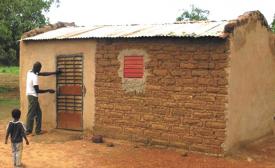
Each Sunday over 55 people meet for worship in the tiny church in the village of Fon, Burkina Faso. The Foothills church honey money from the summer of 2018 will go toward a necessary expansion of the church building since members have increased as some Christians have been pushed off their nearby lands due to tensions in the country. Pictured, Josue Coulibaly’s brother Emmanuel and his son are among the displaced. (Photo by Josue Coulibaly)
The hard work of some Alberta bees creates a sweet deal for two very different churches. The “Bees for Burkina” project gives people of Foothills Mennonite Church in Calgary a chance to buy local honey, while the profits provide Mennonites in Burkina Faso with financial assistance to build their church.
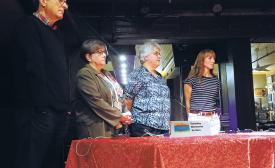
Members of the first-place Bible Quizzing for Grown-ups team, the Canadian Mennonite Scribes, are pictured, from left to right: Jim Loepp Thiessen, pastor of Floradale Mennonite Church; Ginny Hostetler, CM’s executive editor; Barb Draper, CM’s editorial assistant; and Tobi Thiessen, CM’s publisher. (Photo by D. Michael Hostetler)
As people gathered for the Bible Quizzing for Grown-ups event on Sept. 30 at the Huether Hotel in Waterloo, the room buzzed with conversation, but when the quizmasters began reading questions from the Gospel of Luke, the room went quiet. The mood was light-hearted, but definitely competitive as eight teams listened intently and searched their memories for the right answers.
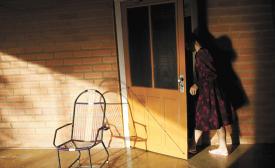
The Manitoba Colony is one of more than 80 Mennonite colonies in Bolivia. On one of the photographer’s last days in Manitoba, he and his sister were told by multiple women that, after the ‘ghost rapes’ of 2009, the nighttime rapes still happen, although less frequently. (Photo by Noah Friedman-Rudovsky)
Eight men went to prison, the media gaze moved on and colony life resumed. But the saga of mass rape in the Bolivian corner of our family of faith is far from over.
The crime could not have been more salacious, nor the scandal more sensational. And the truth of it all could not trace a more complicated path right back to our own enlightened hearts.
Eight men went to prison, the media gaze moved on, and colony life resumed. But the saga of mass rape in the Bolivian corner of the Mennonite family of faith is far from over.

Werner and Joanne DeJong enjoy the company of new friends in a coffee shop across from Meserete Kristos College in Ethiopia. ‘In a communal-based society like Ethiopia there are more opportunities to sit, visit and sip coffee under the trees,’ says Joanne, who is impressed with the strong emphasis the college places on peace, justice and community development. (Photo courtesy of Joanne DeJong)
Werner and Joanne DeJong faced a challenging decision. After many years of pastoral ministry with Edmonton’s Holyrood Mennonite Church, they felt called to consider ministry in East Africa. The call, however, was not equally clear for each of them or for their congregation.
People who are involved in service are typically practical, caring people; in other words, people of action. Of course the motivation for doing service is to follow Jesus and his teaching, to reach out to the weak, to the orphans and widows, and so on, according to Jeremiah 22:3 and James 1:27.
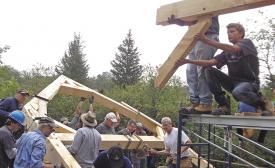
Volunteers raise the timbers of the second timber-frame cabin to be built this year at Shekinah Retreat Centre. (Photo courtesy of Priscilla Epp)
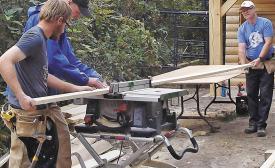
From left to right, volunteers Ryan Siemens, Curtis Wiens and Gord Siemens cut a board to be used in the timber-frame cabin constructed during the MDS Family Project held at Shekinah in August. (Photo courtesy of Priscilla Epp)
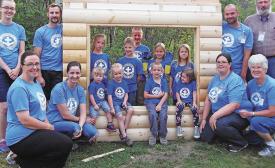
The families pictured here volunteered from Aug. 5 to 10, 2018, during Week 2 of the MDS Family Project at Shekinah Retreat Centre. They helped assemble wall units for the timber-frame cabin. (Photo courtesy of Priscilla Epp)
Ike and Priscilla Epp aren’t quite sure how many people volunteered to help build the second timber-frame cabin at Shekinah Retreat Centre, but they know there were many.
The project took place during the month of August at the Mennonite Church Saskatchewan-owned camp north of Waldheim, and was designated a Mennonite Disaster Service (MDS) Family Project.
In 2014, five years after Warden Woods Mennonite Church in Toronto closed, a new congregation began to form in the Warden Woods community. Led by Jordan Thoms, the Warden Underground is focussed on 15-to 30-year-olds.
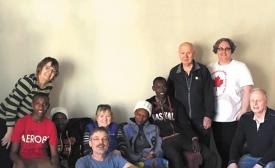
Some church members and the refugee family in their new home in March 2018. Pictured from left to right: Lois Braun, Heritier Munezero, Claudine Uwimpuhwe, Siggi Holzhaeuer, Katherine Morgan, Speciose Nyiramugwaneza, Emmanuel Iranshubije, Gordon Bueckert, Eileen Scharfenberg and Dave Martens. (Photo by Cornie Thiessen)
When Sterling Mennonite Fellowship received an invitation from St. Vital Evangelical Mennonite Church (EMC) to partner in sponsoring a refugee family, it felt like an answer to prayer.